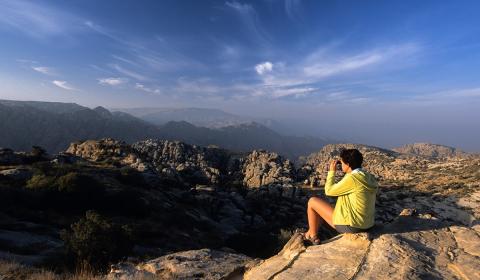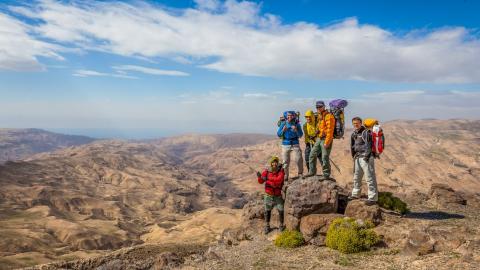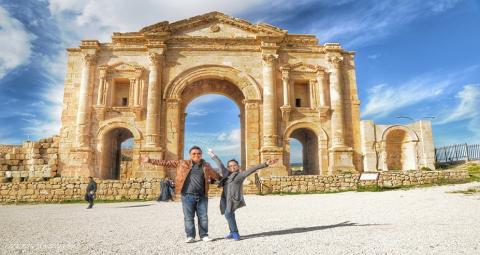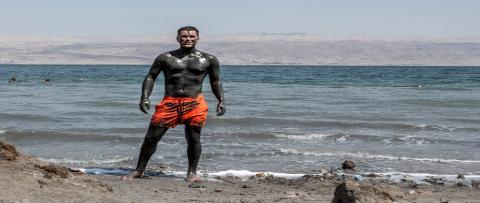Religion
Jordan is a tolerant, Islamic state that welcomes all religions. A majority of Jordanians are Muslim, about 92% are Sunni Muslim, and 1% are Shia or Sufi. Cities in the south of Jordan, have the highest percentage of Muslims. Christians, living mostly in Amman or the Jordan Valley, make up 6% of the total, with 1% representing other religions.
One of the 5 essential Pillars practiced by Muslims is the recitation of prayers five times a day. Calls to prayer are announced publicly by mosques and can be heard throughout the Kingdom. The devout unroll a small prayer rug and face Mecca to pray. Ramadan, the 9th month of the Islamic calendar, is a time of fasting from sunrise until sunset. Most public restaurants do not open for business until just before sunset. At sunset, the families mark the occasion with large feasts and special sweets. Another Pillar of Islam is the Hajj, the holy pilgrimage made at least once during a lifetime to Mecca.
Classes and Castes
All social and political systems of Jordan are centered around extended patriarchal family units based on ancestry and wealth. Family units are often led by sheikhs whose rule depends on the size of their family, their wealth, and the will of their personalities. After the death of a sheikh, the eldest son ascends to the position of head of the family.
Marriage
Getting married and having children are top priorities. The wedding has two celebrations: an engagement party and a wedding party. After the engagement party, the process of dating and getting to know each other begins. After the engaged womans and man have signed the papers at the engagement party, they are legally married. if they chose not to proceed, even though they have not lived together, they must divorce.
Child Care
Women are the primary caregivers for the children. After the first son i born, the father and mother take the name of the son. If the son's name is Mohammed, the father becomes Abu Mohammed, meaning "father of Mohammed", and the mother becomes Om Mohammed, or "mother of Mohammed".
Education
Primary education is free and compulsory, starting at age 6 until a child is 16 years old. All students are required to take an extensive exam called "Tawjehieh" before graduating from secondary school and as a prerequisite for entering universities and colleges.
Secular Celebrations
Jordanians follow the Islamic calendar. National holidays include Arbor Day (Jan 15), Arab League Day (Mar 22), and Independence Day (May 25). Religions holidays include Id al-Fitr (the end of Ramadan), Id al-Adha (the Feast of Sacrifice), the Islamic New Year, the birthday of Mohammed, and Leilat al-Meiraj (the Ascension of Mohammed).
Social Interaction
Social interaction in Jordan is replete with all kinds of seemingly impenetrable verbal and behavioural rituals, most of which can remain unaddressed by foreigners with impunity. A few things are worth knowing, however. The energy which Jordanians put into social relationships can bring shame to Westerners used to keeping a distance. Total strangers greet each other like chums and chat happily about nothing special, passers-by ask each other’s advice or exchange opinions without a second thought, and old friends embark on five-minute volleys of salutations and cheek-kisses, joyful arm-squeezing or back-slapping, and earnest enquiries after health, family, business and news. Foreigners more used to avoiding strangers and doing business in shops quickly and impersonally can come across as cold, uninterested and even snooty. Smiling, learning one or two of the standard forms of greeting, acknowledging those who are welcoming you and taking the time to exchange pleasantries will bring you closer to people more quickly than anything else. People shake hands in Jordan much more than in the West, and even the merest contact with a stranger is normally punctuated by at least one or two handshakes to indicate fraternity. In an informal situation such as walking down the street, people will tend to walk very close together in small groups. It is common for good friends of the same sex to hold hands or interlock arms while walking and talking together. This is a way of expressing their friendship.
The Meaning of Coffee
In tribal bedouin culture, where the mark of a man is how he treats his guests, and where what is unsaid has as much (or more) resonance than what is said, coffee plays a hugely significant symbolic role. In some areas, merely starting to make coffee is a signal to families in neighbouring tents that something is afoot: by pounding freshly roasted beans in a mihbash – a form of pestle and mortar, sometimes wood, sometimes metal – using a distinctive rattling or jangling sound, a man (it’s always a man) can send out a wordless invitation from his tent for all within earshot to gather round. He brews the coffee with cardamom in a dalleh, a long-spouted pot set in the embers, and then serves it to everyone present in tiny thimble-sized cups, always beginning with the guest of honour and proceeding clockwise around the circle. The first cup is known as l’thayf (“for the guest”), to indicate hospitality. The second is l’kayf (“for the mood”), to indicate a relaxed atmosphere. The third is l’sayf (“for the sword”) to show that any animosity has evaporated. Then, and only then, can the social interaction or discussion begin.
Gestures and Body Language
There’s a whole range of gestures used in Arab culture which will either be new to you or which carry different meanings from the same gesture in your home country. Rather than nodding, yes is indicated by inclining your head forwards and closing your eyes. No is raising your eyebrows and tilting your head up and back, often accompanied by a little “tsk” noise (which doesn’t indicate impatience or displeasure). Shaking your head from side to side means I don’t understand. A very useful gesture, which can be used a hundred times a day in all kinds of situations, is putting your right hand over your heart: this indicates genuineness or sincerity, and can soften a “no thanks” to a street-seller or a “sorry” to a beggar, or reinforce a “thank you very much” to someone who’s helped you. Many people in the south of Jordan will instinctively touch their right hand to their heart after shaking hands.
One hand held out with the palm upturned and all five fingertips pressed means wait. A side-to-side wrist-pivot of one hand at chest level, palm up with the fingers curled, means what do you want? If someone holds their flat palm out to you and draws a line across it with the index finger of the other hand, they’re asking you for whatever document seems relevant at the time – usually a passport. You can make the same gesture to ask for the bill (check) in a restaurant.
Pointing at someone or something directly with your index finger, as you might do at home, in Jordan casts the evil eye; instead you should gesture imprecisely with two fingers, or just flap your whole hand in the direction you mean. Beckoning with your palm up has cutesy and overtly sexual connotations; instead you should beckon with your palm facing the ground and all four fingers together making broom-sweeping motions towards yourself.
In all Arab cultures, knowingly showing the soles of your feet or shoes to someone is a direct insult. Foreigners have some leeway to err, but you should be aware of it when crossing your legs while sitting: crossing ankle-on-knee means your sole is showing to the person sitting next to you. Copying the Jordanian style of sitting on a chair – always keeping both feet on the floor – is safest. Sitting on the floor requires some foot-tucking to ensure no one is in your line of fire. Putting your feet up on chairs or tables is not done.
Another major no-no is picking your teeth with your fingers; Most diners and restaurants offer toothpicks, which should be used surreptitiously behind your palm.
Music
Music is important in Jordanian life. Traditional Arabic music is based on a five-tone scale, unlike our Western seven-tone system. The rhythms are elaborate. Songs often tell stories of family, honor, love and death. Most instrumentalists accompany a vocalist rather than playing on their own, and improvisation is common. Some Arabic instruments include the oud (similar to a lute), the mizmarmujwiz or nay (both types of flute), the rababah (a type of violin with one string), and the gerbeh (like bagpipes). Small drums, played on the lap, are used to keep the rhythm.
Handicrafts
Traditional handicrafts in Jordan have been passed down over many generations, from a time when all Jordanians met their domestic needs by weaving their own rugs and making their own earthenware vessels and utensils. An impressive cultural mélange of Arab and Islamic imagery is reflected in Jordanian crafts, which include beautiful handmade glass, handy earthenware vessels, skilful basket and carpet weaving, and exquisite embroidery. Crafts produced on a smaller scale include artistically decorated sand bottles, finely chiseled sculptures, and uniquely crafted silver jewellery.




